- Editorial Offices
- 325 Brantly Hall
- Missoula, MT 59812
- (406) 243-2488
- themontanan@umontana.edu
- Icons By Maria Maldonado
UM students travel to Germany to gain hands-on experience telling stories of refugees
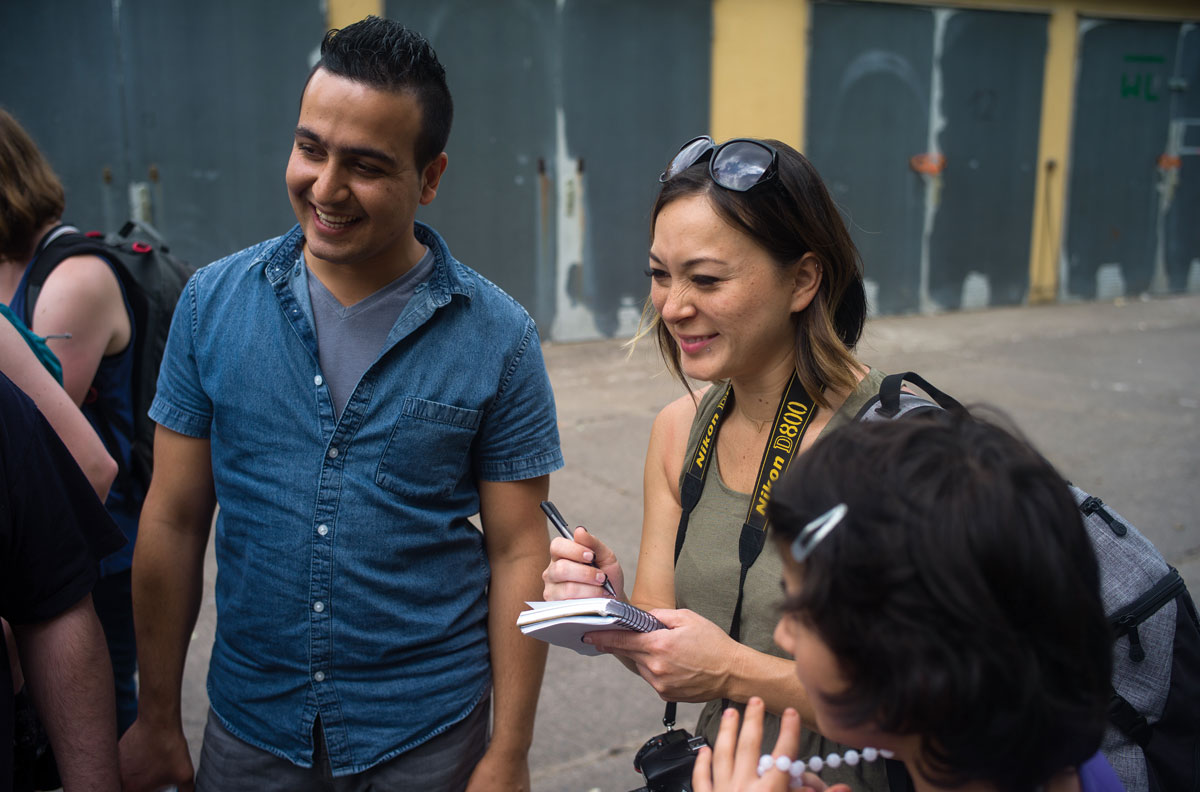
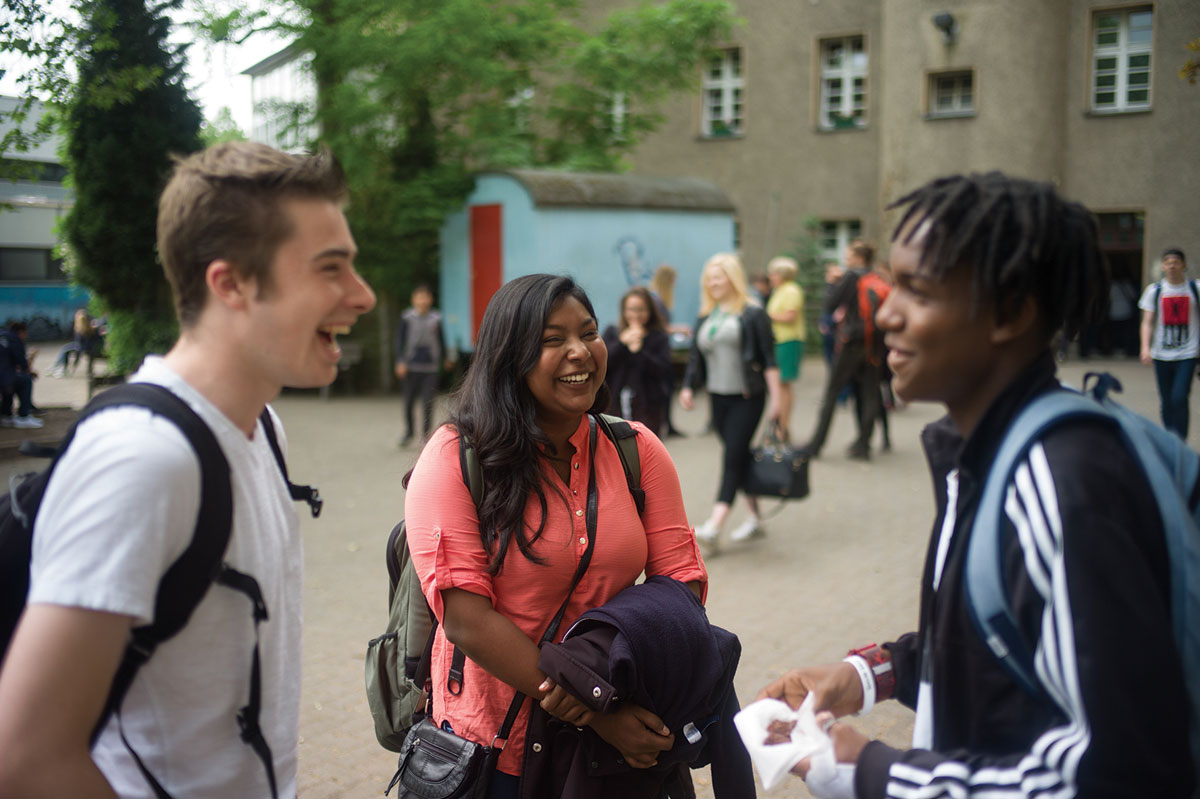
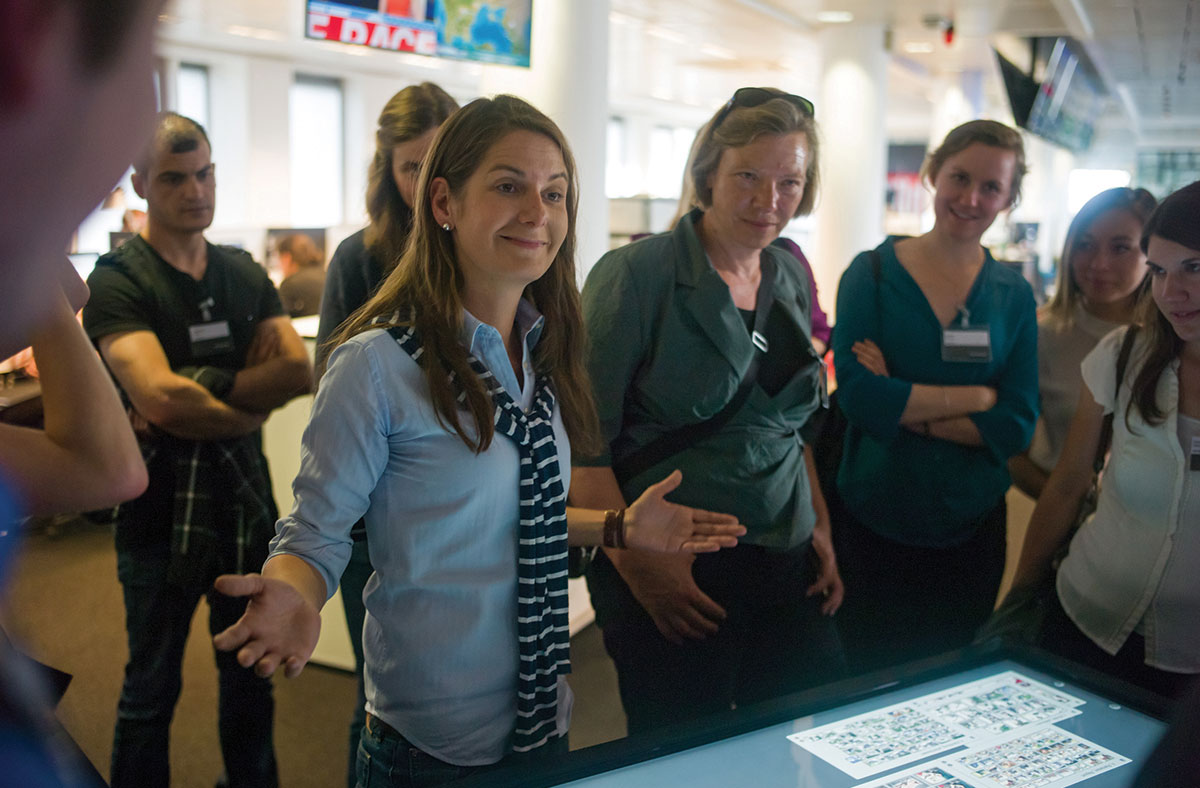
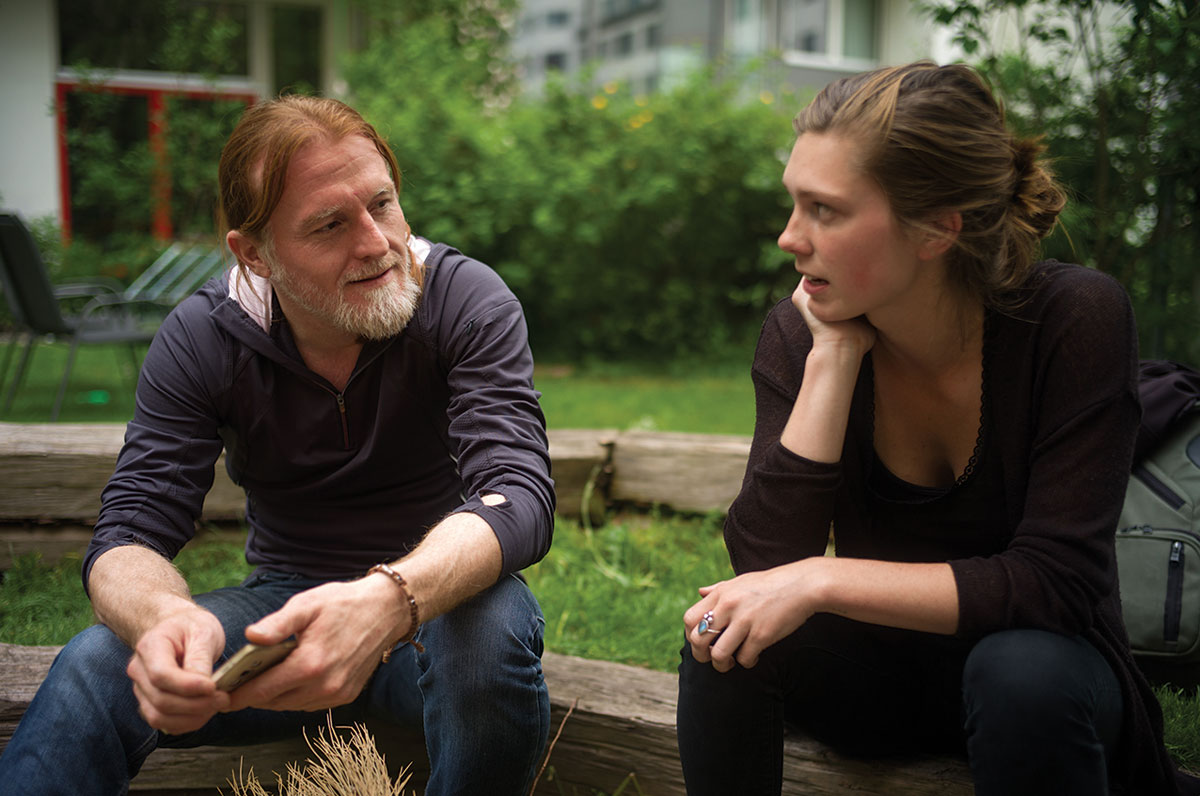
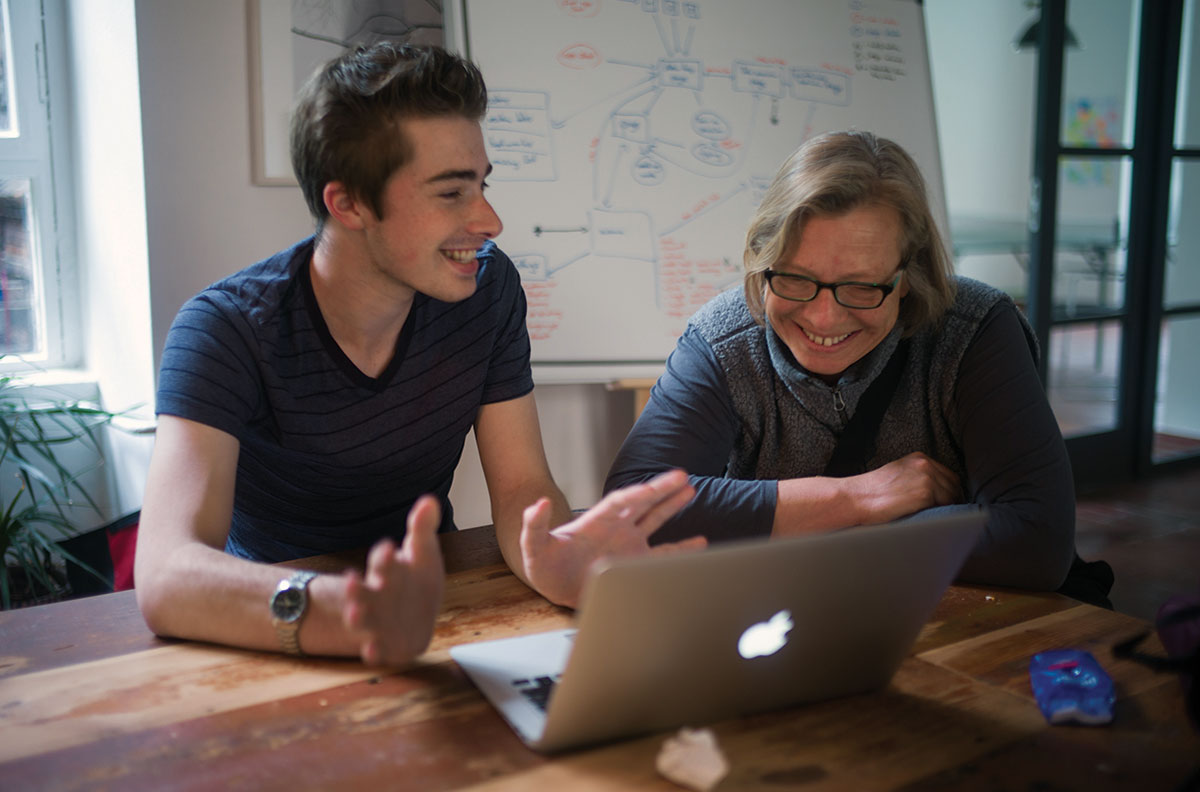

This whole idea was hatched over breakfast. Pancakes, to be precise.
You see, Shane McMillan, a 2010 graduate of the University of Montana School of Journalism who now is a photographer/documentarian based in Berlin, and UM Associate Professor Henriette Löwisch, who splits time between Missoula and the German capital, have a ritual. Whenever their schedules align, McMillan makes the five-minute trek by bicycle from his house to Löwisch’s, and they share pancakes.
“It’s our tradition,” says McMillan. “We pitch stories back and forth, pitch ideas for projects and we catch up on what’s going on at the J-school. And we always have pancakes.”
The duo first met in 2006, when McMillan was a freshman at UM and Löwisch, a Germany native, was the visiting T. Anthony Pollner Professor. McMillan, who also studied German at UM, says Löwisch seemed to be surprised that some random ranch kid from Ronan could speak her language.
“So we always stayed in touch,” says McMillan, who upon graduation landed a Fulbright Fellowship in Berlin working for the Associated Press.
At one of their breakfasts a couple of years ago, they brainstormed an idea where students from UM would get out in the world and cover real issues. Löwisch teaches an international reporting class, and they imagined how beneficial it would be to have the class come to Berlin and cover a current story – a big story – something they couldn’t cover in Montana on the same scale as they could in a place such as Berlin. The students could experience metropolitan, big-city journalism. They could learn how to juggle deadlines, work with a foreign language and travel in a foreign country.
“We just wanted them to experience all of those things,” McMillan says.
After asking her students how they’d reinvent Löwisch’s class, the overwhelming response was to get real-world experience. Hence, the Missoula to Berlin project was born.
All that was needed was a topic, and while the project leaders were pondering possible ideas, one of the biggest international news stories of the past couple of years unfolded: the European refugee crisis.
“I’ve been pushing hard since I came through the door to get more international study trips going,” says Larry Abramson, UM’s School of Journalism dean since 2014. “I had a number of destinations picked out, but when (Löwisch) said she thought this was the ideal time to go to Berlin, I think a light went on in both of our heads. It was clear to me that her connections and what was going on in the news just made this the perfect opportunity. So I threw my full support behind it.”
Since the refugee crisis started, more than 1 million people have sought asylum in Germany. At its peak, more than 10,000 people, mostly Syrian, were crossing Germany’s border per day. As one can imagine, many issues have surfaced because of the influx of people, McMillan says.
“It’s not only what do we do with all of the refugees,” he says, “but also it’s what do we do about the Germans and their response?”
The project piqued the interest of 18 UM students, who signed up for the three-week study-abroad opportunity to dig deep into the issue. They took a one-credit seminar during fall semester 2015 to start learning about the project and to raise funds. The students also were required to take Löwisch’s international reporting class during spring semester 2016.
Interestingly, not all participants were journalism students. Some studied computer science; some were in political science. There also was a German student and an anthropology student.
“I think what we appreciated about the diversity of the group is some of the nonjournalism students really brought a perspective that we valued tremendously,” Abramson says. “We got to see them get excited about journalism for the first time. I think it was a great cross-pollination of studies. We had an all-star team.”
Abramson has a long history with Berlin. He studied German in high school and college and started traveling to Europe in the 1970s. One of the first European capitals he visited was Berlin, when it still was a deeply divided city.
“I ended up coming back several times, including in the early 1980s when I got what is essentially a Fulbright to live in Berlin and study at the Free University, which was the only university in West Berlin,” he says. “I spent a lot of time wandering around the city at the time it was divided, and was kind of a gathering place for freaks and strange people of all persuasions.”
When the Berlin Wall came down in 1989, Abramson worked at National Public Radio. Since he spoke German, he went back to cover the aftermath.
“I’ve had a real fly-on-the-wall opportunity to view Berlin over and over again,” he says. “In some ways I have a longer history with Berlin than I do with any place in the United States. It really has been through transformations that are unimaginable for other cities, and the fact that we got to see one of its most recent transformations into this multicultural capital was wonderful. In a way I almost saw it as a black-and-white film, while the students looked at it in high definition through their younger lenses.”
Upon their arrival in Germany in May, the students were off and running. The Missoula to Berlin project was broken up into three pieces. The first week was an intense introduction to Germany and the refugee topic. They’d wake up, visit a shelter, talk to an expert or see a refugee center. They’d interview doctors, lawyers and other people involved with refugees. They also mixed in some sightseeing to get a feel for what Berlin is like. The second week involved the students going out and reporting, which was combined with visits to different television, print and online newsrooms throughout the city. During the last week, the group went into production mode.
The students immeasurably benefited from having four refugee translators aiding them in their pursuits. McMillan spent weeks cultivating relationships with the translators before the students’ arrival.
“Obviously I wanted the students to do good journalism, and I wanted them to do it on deadline, and I wanted it to be crisp and clean,” McMillan says. “But the most important thing to me was they came and experienced refugees at eye level. To encounter them as people, and not just as subjects and victims of this situation. I wanted the students to encounter them as equals. That’s the reason why I did this and put a lot of energy into having translators. I wanted them to build relationships. That was critical.”
McMillan’s goal was realized – especially through the eyes of UM senior and photojournalism major Sachi Sinhara.
Sinhara, a worldly student, grew up in Sri Lanka, the daughter of photojournalists who’ve covered major news there since the 1970s. She studied at the Queen’s University in Belfast, Northern Ireland, and during her time at UM, she’s visited Nicaragua and Kenya.
“When we left Missoula, we were calling them refugees,” Sinhara says. “We thought of them as just a whole other group of people. I really didn’t know what I had in mind, but I was expecting to find something different about them. But the moment we met them, there was really no difference.”
She says they are similar to people she meets daily on campus, noting some of the Syrians had skin color as light as her American friends and had blonde hair and blue eyes.
“And they all have similar dreams as us,” she says. “They want to go to university, or they already have finished. So we met this group of people who aren’t a lot different than the people who graduate from UM. Both groups are in a waiting period, trying to figure out what to do next.
“So my mindset about refugees – and just the term ‘refugee’ – changed. Almost everybody who we met didn’t like the term ‘refugee.’ We started calling them ‘people seeking refuge,’ because they are also people. That was the biggest change for me.”
The students produced a website with stories, photos, videos and audio, which is online at missoulatoberlin.atavist.com/missoula-to-berlin. The topics range from an organization that provides refugees free bicycles to a take on the popular “Humans of New York” photo project they titled “Humans of Berlin.”
“They found really interesting stories,” McMillan says. “It’s hard to go to a place where you don’t speak the language of the people you want to report on. So it was a multilayered cake of challenge. They had a lot of different things that they had to work on, and they handled it all really well. That’s where I was most proud of them. They made a lot happen in a very small amount of time.”
Sinhara says she benefited from the trip and is a better journalist for participating. And she definitely found perspective.
“The way photojournalists have portrayed refugees to the world, I kind of got angry about that, because that’s not who they are,” she says. “Germany’s doing an amazing job taking care of these people. I wanted to tell more intimate stories instead of just capturing the moment. I could have taken any kind of photo there and say this place is this way, something that is mainstream. But I just didn’t see it. I saw regular people. What we see in the media is a smaller percentage of people. I realize there’s a whole other level to storytelling now. I want to learn more about that.”
Seeing students do this kind of work and having these types of experiences gives McMillan hope for the future of journalism.
“It’s so important that we have journalists who care about social issues, and don’t just do it in this way that’s sort of hokey and simplified and glazed over,” he says. “So for me to bring students from my school to the city where I began my career was really cool. It was interesting to watch them walk into this new system and try to make sense of it.
“It made me proud,” he says. “UM turns out incredible graduates who can compete with anyone, and it’s exciting to see and participate in it and to be engaging with them on the things they’re thinking about and how they express it in their work. I really love that.”
Sinhara couldn’t agree more.
“UM is a place for exploring the world,” she says. “You may not really feel like it when you’re stuck in Missoula in the middle of winter, but really, UM prepares you to do something more.”
In the rearview mirror, international reporting trips appear as a blur of experiences, but for each reporter, one moment always sticks out.
For me, that moment struck on a Saturday in May at an emergency shelter for refugees in Karlshorst, a residential neighborhood in the eastern part of Berlin.
That day, the students arrived at Karlshorst on the S-Bahn, the 150-year-old suburban train system that’s prone to construction. It was the fourth day of their stay in Berlin and the first time they navigated the city on their own. There were no tour buses on this study-abroad program, so it took some detours and delays until the group assembled at the station to start the 20-minute walk to the camp.
Karlshorst is where the Soviets set up their headquarters after entering Hitler’s capital in 1945. We passed remnants of their military presence on our way. The shelter itself occupied buildings once used by the Stasi, the East German state security service infamous for spying on its own people.
Like an old mansion, Berlin has accumulated layers of historical wallpaper over the centuries that provide glimpses of the past. We were there, however, to document the present, to bear witness to living history.
Journalist Bernd Pickert, who works for a German daily called Tageszeitung, arranged for a spokesman of the German Red Cross to give us a tour of the shelter. The Red Cross was in charge of the 1,200 residents, most of whom had arrived the previous summer, when unprecedented numbers of refugees flocked to Germany, prompting German Chancellor Angela Merkel to exclaim, “Wir schaffen das,” – “We can do this.”
The visit was a rare privilege for any journalist. Access to refugee shelters is a challenge, even for local reporters covering one of the biggest news stories of 2016, with supervisors often citing security or privacy issues in their efforts to control the message.
As we toured the camp, refugees of all ages crowded around us clamoring for attention, especially the children. In Germany, permission is needed to publish images of small kids. The students found workarounds, photographing the children’s feet instead, some on roller skates, others riding their bikes across the grounds.
After months of prereporting and pitching, the students were finally speaking to refugees, many of whom had braved the Mediterranean Sea on flimsy boats seeking safety in Europe.
A year prior, when I asked my international reporting class to reinvent the course, students said, nearly unanimously: “Let’s climb out of the sandbox. Let’s do some real reporting. Let’s go to this Berlin you keep on telling us about!”
From its world-class museums to its legendary club scene, Berlin is an attractive city. Many of its residents speak English, it’s comparatively safe and it’s cheap. It’s on the itinerary of several UM study-abroad programs, and UM has two partner institutions there.
But for the 18 UM students on this trip, Berlin’s attractions were but a sideshow. They went for a story that had moved them deeply: the story of Syrian refugees.
From the beginning they approached the project with an entrepreneurial spirit. Aided by a UM alum, they mounted a fundraising effort. They recruited more participants and, last spring, went out and reported on Missoula’s own refugee debate. They studied maps of Europe and asked for the advice of journalists who had covered the crisis, some happy to talk to them because they, too, had once gone to school at UM.
Now, on this day at Karlshorst, they paid little attention to the Red Cross spokesman. Instead, they listened to residents’ complaints about the food and sanitary conditions. They formed bonds with a young man who had just been elected to a council of residents and with another who felt like a stranger in the midst of his compatriots because he’s an atheist. They passed out their cell phone numbers – all of them had struggled to figure out how to acquire a German SIM card, which now came in handy.
Afterward, exhausted, a group of us sat down on the curb near the entrance and asked the journalist who had brought us to the shelter about his experiences volunteering there – he had set up a bicycle repair shop, providing the refugees with donated bikes so they could ride into town, an initiative similar to the one that later became the subject of one of the student teams’ stories.
Pickert, a soft-spoken man, calmly explained why he agreed with Germany opening its borders to a million refugees in 2015. It remains a highly contested decision that later brought charges against the German media for suppressing the negative impacts of the influx, as one student reported in his story from the trip. The students, whether majoring in journalism or not, struggled with one of the biggest questions of our profession: How can you be a journalist and a human being at the same time?
Pickert said that as a resident of Karlshorst, he had to lend a hand – that his duty as a journalist to keep an open mind and critically assess policy didn’t release him from his obligation as a citizen. The volunteer work mostly gave him joy, though he sometimes struggled to process personal stories he might have never heard if he had simply stayed at his editorial desk.
He told us about a Syrian man who lost everyone but his small son on the trip from Turkey to Greece. Now he was straining to navigate German bureaucracy, lying awake at night and worrying about the fate of his wife. The seasoned journalist’s voice broke for a fraction of a second, and a wave of sadness swept over all of us sitting there: the students, the refugee translators embedded in our team and myself. Germans aren’t prone to crying in public, so I blinked away the wetness rising in my eyes.
It was time to go.
In the weeks that followed, the students agonized under the pressure of producing their stories on deadline. Some returned to Karlshorst for more interviews, while others ventured into other parts of the city, plucky and persevering. We worked through the nights, visited startups and media offices, took in some sights and met some amazing people.
Now, with a bit of distance, we still have to find the time to share our respective moment with each other: the one that changed each of our lives, our viewpoints, our careers.
Or maybe all three.
– Henriette Löwisch is an international journalist who has worked across continents and media. She’s served on UM’s School of Journalism faculty since 2009 and directs its graduate program.